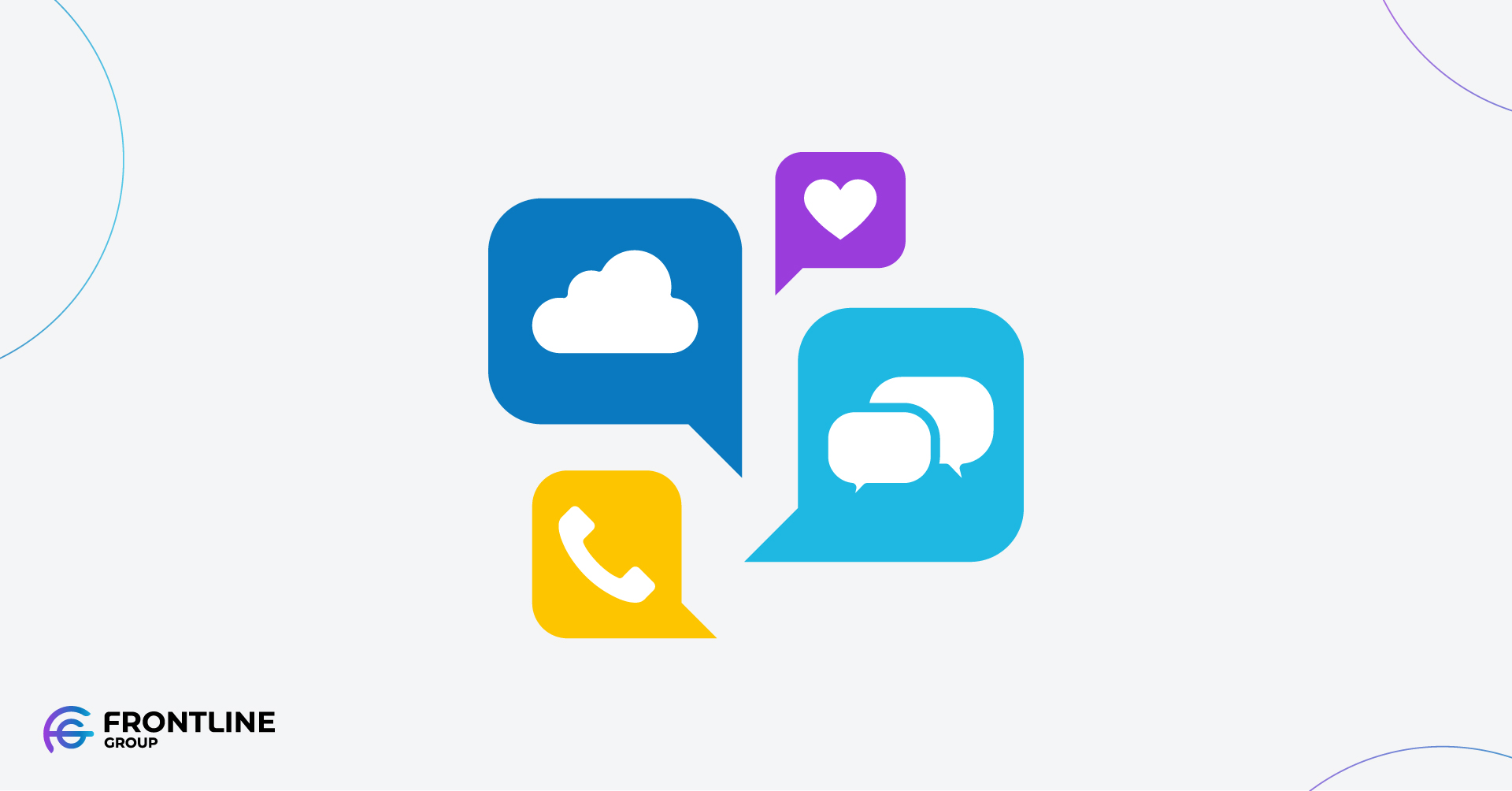
Customer service has undergone a dramatic transformation over the decades, evolving from basic in-person interactions to sophisticated, multi-channel engagements. As technology has advanced, so too have customer expectations. Today’s customers demand immediate, personalized, and seamless experiences across all touchpoints. For businesses, especially contact centers, adapting to these evolving expectations is crucial for maintaining customer satisfaction and loyalty.
In this blog, we’ll explore the history of customer service, the changing expectations of modern customers, and how contact centers must adapt to stay relevant. We’ll also highlight how Frontline Group’s innovative solutions can help businesses meet these new demands effectively.
The History of Customer Service and Contact Centers
Customer service has a rich history that reflects the evolution of communication technologies and societal changes. Understanding this history provides valuable context for how contact centers have developed and adapted over time.
Early Forms of Customer Service
In the early days of commerce, customer service was a face-to-face interaction. Customers would visit stores and speak directly with shopkeepers to address their needs. This in-person approach was the only available method for customer support, relying heavily on personal relationships and the reputation of the business.
The Introduction of the Telephone and the Rise of Call Centers
The invention of the telephone in the late 19th century revolutionized customer service. Businesses could now handle customer inquiries and complaints over the phone, expanding their reach beyond local interactions. The first call centers emerged in the 1960s, primarily as help desks for technical support and customer inquiries. These early call centers were rudimentary but laid the foundation for more structured and scalable customer support systems.
The Advent of Email and the Internet
The late 20th century saw the rise of email and the internet, which added new dimensions to customer service. Email support allowed for more detailed and asynchronous communication, enabling businesses to handle complex issues and provide written documentation. The Internet facilitated the creation of online customer support portals and FAQs, allowing customers to find answers independently.
The Emergence of Social Media
In the early 2000s, social media platforms like Facebook and Twitter became popular channels for customer service. Customers began to expect real-time responses to their inquiries and complaints posted on these platforms. Social media shifted customer service to a more public forum, where interactions were visible to a broader audience, increasing the pressure on businesses to provide prompt and effective resolutions.
The Shift Towards Omnichannel Customer Service
Today, the concept of omnichannel customer service has become the standard. Customers interact with businesses through multiple channels; phone, email, chat, social media, and more, and expect a seamless and consistent experience across all platforms. Contact centers have evolved to integrate these channels, providing a unified approach to customer support.
The journey from in-person interactions to omnichannel customer service illustrates the dynamic nature of customer expectations and the continuous need for businesses to adapt. What are the modern customer experiences and how are they shifting how contact centers operate?
Changing Customer Expectations
As technology and communication channels have evolved, so too have customer expectations. Modern consumers are more informed, connected, and demanding than ever before. Here are the key aspects of these evolving expectations:
Immediate and Real-Time Support
In today’s fast-paced world, customers expect immediate responses to their inquiries. The rise of instant messaging, chatbots, and social media has conditioned consumers to seek real-time support. Delays in response can lead to frustration and a negative perception of the brand.
Personalized and Contextual Interactions
Customers now expect interactions to be tailored to their specific needs and preferences. They want businesses to recognize them, understand their history, and anticipate their needs. Personalization goes beyond just using a customer’s name; it involves providing relevant recommendations and solutions based on past interactions.
Seamless and Consistent Experiences Across Multiple Channels
With the proliferation of communication channels, customers expect a seamless experience regardless of how they choose to interact with a business. Whether through phone, email, live chat, or social media, the experience should be consistent and cohesive. Information shared on one channel should be accessible across others, preventing customers from having to repeat themselves.
Higher Emphasis on Self-Service Options
Modern consumers value convenience and efficiency, often preferring to resolve issues on their own. Self-service options like FAQs, knowledge bases, and automated assistants empower customers to find answers quickly without needing to contact support. These tools not only enhance the customer experience but also reduce the burden on contact center agents.
Increased Focus on Data Security and Privacy
With growing awareness of data breaches and privacy issues, customers are increasingly concerned about how their personal information is handled. They expect businesses to implement robust security measures and be transparent about how their data is used and protected. Trust is a critical factor, and mishandling data can severely damage a brand’s reputation.
Understanding these evolving expectations is crucial for businesses to adapt and meet the demands of modern customers. In the next section, we will explore how contact centers can adapt to these changes and enhance their operations to provide superior customer service.
How Contact Centers Must Adapt
To meet the evolving expectations of modern customers, contact centers must implement strategic changes and leverage advanced technologies. Here are key ways in which contact centers can adapt:
Implementing Advanced Technologies
Utilizing AI, chatbots, and machine learning can significantly enhance the efficiency and responsiveness of contact centers. AI-driven tools can handle routine inquiries, freeing up human agents to focus on more complex issues. Chatbots provide instant, real-time support, ensuring customers receive immediate assistance.
Omnichannel Integration
Ensuring a unified customer experience across all communication platforms is essential. Contact centers should integrate phone, email, live chat, social media, and other channels into a single, cohesive system. This integration allows for seamless transitions between channels and consistent interactions, improving customer satisfaction.
Personalization
Leveraging customer data to provide tailored experiences is crucial. Contact centers should utilize CRM systems and analytics tools to gather and analyze customer information. By understanding customer preferences and behaviors, agents can offer personalized recommendations and solutions, enhancing the overall service experience.
Self-Service Options
Developing robust self-service tools empowers customers to find answers independently. Contact centers should invest in comprehensive knowledge bases, FAQs, and interactive tutorials. These resources enable customers to resolve issues quickly without needing direct support, reducing the workload on agents and improving efficiency.
Continuous Training and Development
Regular training programs for contact center agents are vital for maintaining high service standards. Agents should be trained on the latest technologies, customer service best practices, and effective communication skills. Continuous development ensures that agents are equipped to handle evolving customer needs and expectations.
Proactive Customer Engagement
Adopting a proactive approach to customer service can prevent issues before they arise. Contact centers should utilize predictive analytics to anticipate customer needs and address potential problems early. Proactive engagement, such as follow-up emails or satisfaction surveys, demonstrates a commitment to excellent service and fosters customer loyalty.
By implementing these strategies, contact centers can adapt to the changing landscape of customer expectations, providing superior service and fostering long-term customer relationships.
Frontline Group’s Approach to Adapting Contact Centers
Frontline Group is at the forefront of helping businesses adapt to the evolving landscape of customer expectations. Our innovative solutions are designed to enhance contact center operations, ensuring that businesses can meet and exceed customer demands. Here’s how Frontline Group supports this transition:
Advanced Technology Integration
We leverage cutting-edge technologies like AI, machine learning, and chatbots to streamline contact center operations. Our tools and the tools we use in our contact center automate routine tasks, enabling agents to focus on complex issues that require human intervention. This not only improves efficiency but also enhances the quality of customer interactions.
Omnichannel Support
We offer robust omnichannel integration, ensuring that customers receive a seamless experience across all communication platforms. Our solutions unify phone, email, live chat, social media, and more into a single, cohesive system. This integration allows for smooth transitions between channels, providing consistent and high-quality service.
Data Security and Compliance
At Frontline Group, we prioritize data security and compliance. Our contact center solutions include robust security measures such as encryption and multi-factor authentication. We adhere to industry regulations like GDPR and HIPAA, ensuring that customer data is protected and handled securely. This commitment to security builds trust and confidence with our clients and their customers.
Continuous Training and Development
We believe in the continuous development of our contact center agents. Frontline Group offers regular training programs on the latest technologies, customer service best practices, and effective communication skills. This ensures that our agents are well-equipped to handle evolving customer needs and provide exceptional service.
By partnering with Frontline Group, businesses can ensure that their contact centers are equipped to meet the challenges of modern customer expectations. Our innovative solutions and dedicated support help businesses provide superior service, driving customer satisfaction and business growth.
Adapt Your Contact Center With Frontline Group
Adapting to evolving customer expectations is crucial for contact centers aiming to deliver exceptional service and maintain competitive advantage. As customer demands shift towards real-time support, personalized interactions, and seamless omnichannel experiences, contact centers must embrace advanced technologies and innovative strategies to stay ahead.
Frontline Group provides comprehensive solutions designed to help businesses meet these challenges. By leveraging our expertise in advanced technologies, omnichannel integration, and personalized customer service, we enable businesses to exceed customer expectations and achieve operational excellence. Contact us today to transform your contact center operations and deliver outstanding customer experiences.

Every business is different, that’s why all of our solutions are custom built for you. Let’s chat and see how we can help improve your contact center.

